| | | OFFLINE | | Post: 22.012
Post: 4.640 | Registrato il: 28/08/2005
Registrato il: 20/01/2009 | Administratore | Utente Master | |
|
 GENERAL AUDIENCE TODAY
GENERAL AUDIENCE TODAY
Catechesis on St. Joan of Arc
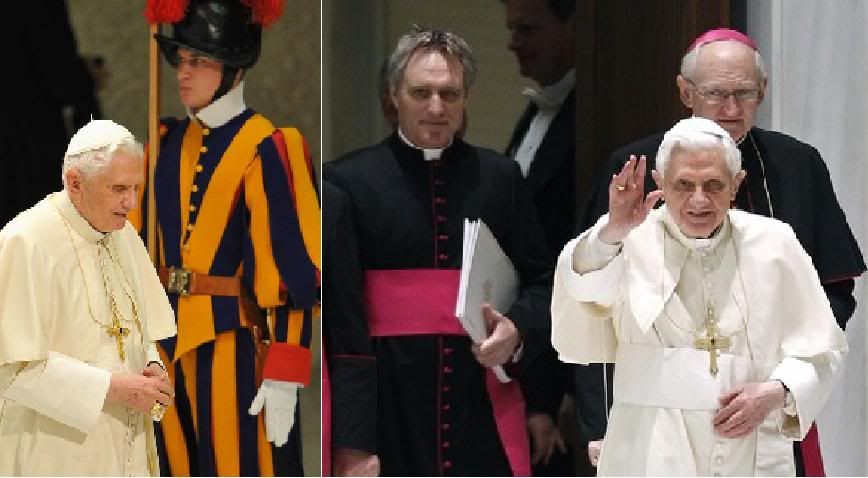
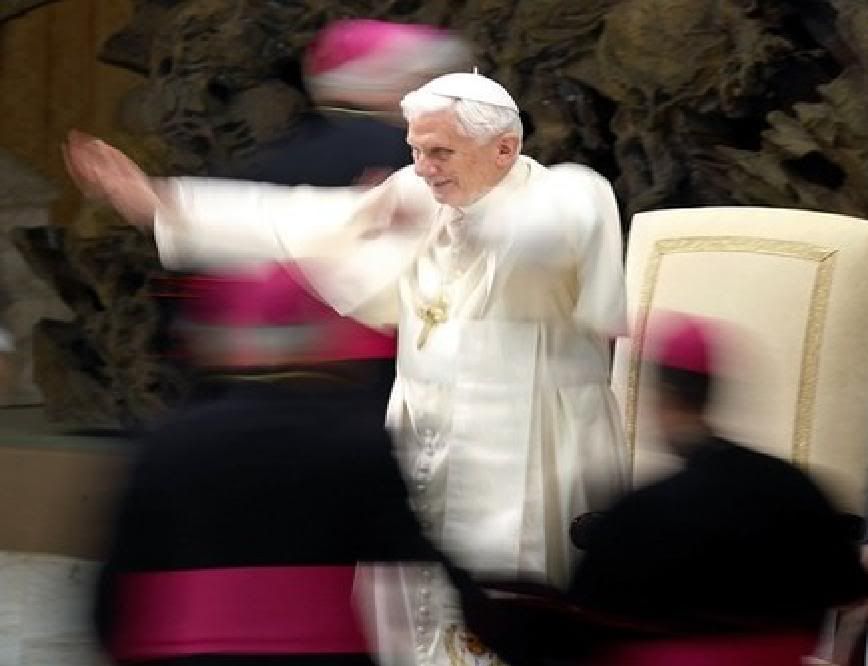
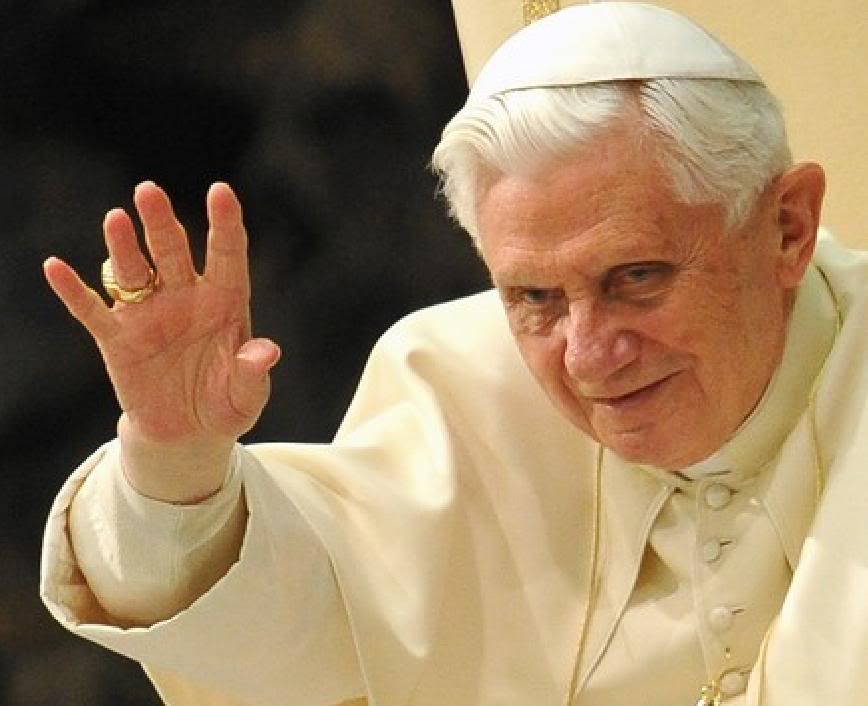
 Joan of Arc can serve as example
Joan of Arc can serve as example
of service for politicians today,
Pope says at General Audience

26 JAN 2011 (RV) - St. Joan of Arc is "a beautiful example of holiness for lay people involved in politics”, especially in “the most difficult situations", Pope Benedict XVI said today, continuing his series of lessons on the great women in the Church of the Middle Ages.
The Holy Father dedicated his Wednesday audience to the French saint burnt at the stake in 1430, at the young age of 18.
Benedict described her as “one of those strong women who brought the light of the Gospel in history to the end of the Middle Ages", whose luminous witness invites us to a high standard of Christian life: making prayer the mainstay of our days, following the will of God whatever it may be, living love without favouritisms and without limits".
He also said her trial “is a shocking page in the history of the Saints and also an illuminating page on the mystery of the Church ,which, in the words of Vatican II, is at once holy and always in need of purification. It was a dramatic encounter between this Saint and her judges, who were clergymen. Joan was accused by them and found guilty to be condemned as a heretic and sent to a terrible death by burning".
He says her judges were "theologians who lacked the charity and humility to see the action of God in this young woman" and who bring to mind the words of Jesus, "the mysteries of God are revealed to those who have the hearts of children, while remaining hidden from the learned and wise".
Thus, Joan’s judges "were fundamentally unable to understand her, to see the beauty of her soul: they did not know they were condemning a Saint”. However, he concluded , her unjust condemnation was overturned twenty-five years later.
Here is how he sythesized the catechesis in English:
Our catechesis today deals with Saint Joan of Arc, one of the outstanding women of the later Middle Ages. Raised in a religious family, Joan enjoyed mystical experiences from an early age.
At a time of crisis in the Church and of war in her native France, she felt God’s call to a life of prayer and virginity, and to personal engagement in the liberation of her compatriots.
At the age of seventeen, Joan began her mission among the French military forces; she sought to negotiate a just Christian peace between the English and French, took an active part in the siege of Orleans and witnessed the coronation of Charles VII at Rheims.
Captured by her enemies the next year, she was tried by an ecclesiastical court and burnt at the stake as a heretic; she died invoking the name of Jesus. Her unjust condemnation was overturned twenty-five years later.
At the heart of Saint Joan’s spirituality was an unfailing love for Christ and, in Christ, for the Church and for her neighbour. May the prayers and example of Saint Joan of Arc inspire many lay men and women to devote themselves to public life in the service of God’s Kingdom, and encourage all of us to live to the fullest our lofty calling in Christ.
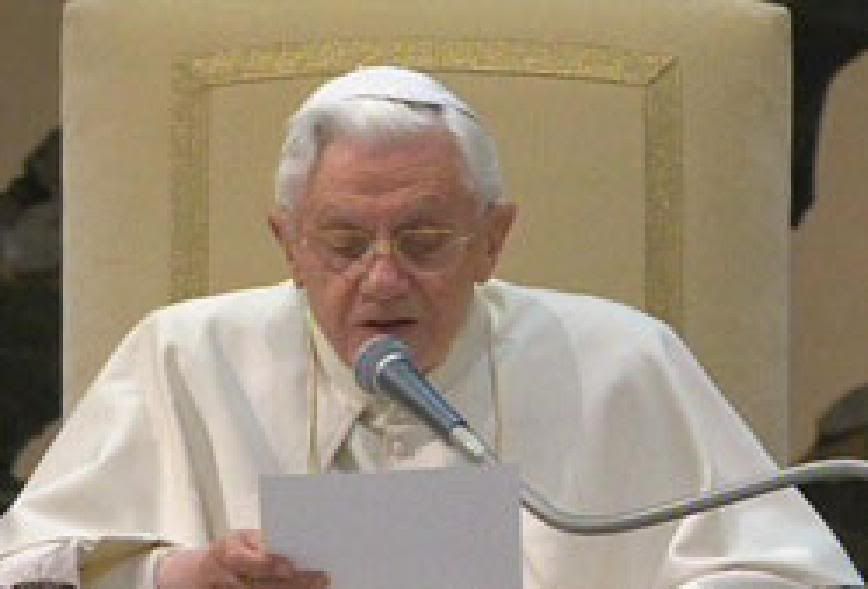 Here is a translation of the full catechesis. (I have chosen to use the French form of Joan of Arc, being her 'original' name. I notice that in his synthesis in German today, the Holy Father used 'Jeanne d'Arc', not a Germanization of it):
Here is a translation of the full catechesis. (I have chosen to use the French form of Joan of Arc, being her 'original' name. I notice that in his synthesis in German today, the Holy Father used 'Jeanne d'Arc', not a Germanization of it):
 Dear brothers and sisters,
Dear brothers and sisters,
Today I wish to speak to you of Jeanne d'Arc (Joan of Arc), a young saint from the end of the Middle Ages, who died in 1431 at the age of 19. This French saint, who is cited many times in the Catechism of the Catholic Church lived shortly after St. Caterina of Siena, patron of Italy, about whom I spoke in a recent catechesis.
They were, in fact, both young women of the people, laywomen and consecrated virgins, two mystics who were involved not behind cloisters but in the midst of the most dramatic events of the Church and the world in their time.
Perhaps they were the most characteristic figures of those 'strong women' who, at the end of the Middle Ages, brought the great light of the Gospel into the complex events of history.
We can place them alongside the holy women who remained on Calvary, close to the crucified Jesus and his mother Mary, while the Apostles had fled and Peter himself had denied him three times.
The Church in their time was going through the profound crisis of the Great Western Schism, which lasted almost 40 years. When Catherine of Siena died in 1380, there was a Pope and an anti-Pope. When Jeanne was born in 1412, there was a Pope and two anti-Popes.
Along with this laceration within the Church, there were continuing fratricidal wars among the Christian nations of Europe, the most tragic of which was the interminable Hundred Years' War between France and England.
Jeanne d'Arc could not read or write, but we are able to know her to the depth of her spirit, thanks to two sources of exceptional historical value: the proceedings of the two trials she underwent.
The first, the Process of Condemnation (PCon), contains the transcripts of the many lengthy interrogations of Jeanne during the last months of her life (February to May 1431), reporting the words of the saint herself.
The second, the Process of Nullification of the Condemnation (or 'Rehabilitation') (PNul), contains the depositions of some 120 eyewitnesses to all the stages of her life. (cfr Procès de Condamnation de Jeanne d'Arc, 3 vol. e Procès en Nullité de la Condamnation de Jeanne d'Arc, 5 vol., ed. Klincksieck, Paris l960-1989).
Jeanne was born in Domremy, a small village on the border between France and Lorraine. Her parents were well-off peasants, known to everyone as excellent Christians. From them she received a good religious education, influenced notably by the spirituality of the Holy Name of Jesus, as taught by St. Bernardino of Siena and spread throughout Europe by the Franciscans.
The name of Jesus was always coupled with the name of Mary, and thus, with a background of popular religiosity, Jeanne's spirituality was both profoundly Christocentric as well as Marian. From childhood on, she showed great charity and compassion for the poor, the sick, and all who suffered in the tragic context of war.
From her own words, we learn that Jeanne's religious life matured with mystic experiences since she was 13 (PCon, I, p. 47-48). Through the 'voice' of the Archangel Michael, Jeanne felt she was called by the Lord to intensify her life as a Christian and to involve herself in person for the liberation of her people.
Her immediate response, her 'Yes', was her vow of virginity, with a new commitment to sacramental life and prayer: daily Mass, frequent Confession and Communion, long periods of silent prayer before the Crucifix or the image of the Madonna.
The young peasant girl's compassion and involvement in the face of her people's suffering were made more intense by her mystical relationship with God. One of the most original aspects of this young woman's holiness was precisely this link between mystical experience and political mission. After years of a hidden life and interior maturation came the brief but intense two years of her public life: a year of action and a year of Passion.
At the start of the year 1429, Jeanne began her work of liberation. Numerous testimonials show us this young woman of 17 years to be a very strong and decisive person who was able to persuade insecure and discouraged men.
Overcoming all obstacles, she met with the Dauphin of France, the future King Charles VII, who, in Poitiers, subjected her to examination by some theologians of the University. Their verdict was positive: They saw nothing bad in her, only a good Christian.
On March 22, 1429, Jean handed an important letter to the King od England and his men who were besieging the city of Orleans (Ibid., p. 221-222).
She proposed true peace with justice between the two Christian peoples, in the light of the Names of Jesus and Mary, but it was rejected, and Jeanne had to commit herself to the battle to liberate the city on May 8.
The other culminating moment of her political activity was the coronation of King Charles VII in Rheims on July 17, 1429. For a whole year, Jeanne lived among the soldiers, carrying out among them a true mission of evangelization.
Their testimonials were numerous regarding her goodness, her courage, and her extraordinary purity. She was called by everyone what she called herself, 'La Pucelle', 'the virgin' (the common English usage is 'the Maid of Orleans' as in 'maiden').
Jeanne's passion began on May 23, 1430, when she was taken prisoner by the enemy. On December 23, she was taken to the city of Rouen, where the long and dramatic Process of Condemnation took place, starting in February 1431 and ending on May 30 when she was burned at the stake.
It was a major solemn process, presided by two ecclesiastical judges - Bishop Pierre Cauchon and the Inquisitor Jean le Maistre - but actually guided by a group of theologians from the famed University of Paris, who took part in the trial as advisers.
They were French ecclesiastics, who having made a political choice opposed to Jeanne's, held a negative judgment a priori of her person and her mission.
This trial is a distressing page in the history of saints, and is also an illuminating page on the mystery of the Church which, in the words of the Second Vatican Council, "is holy at the same time that she is always in need of purification" (Lumen gentiu, 8).
Such was the dramatic encounter between this saint and her judges, who were ecclesiastics. Jeanne was accused and judged by them, and then condemned as a heretic and sent to the terrible death of being burnt at the stake.
Unlike the theologian saints, like Saint Bonaventure, St. Thomas Aquinas and Blessed John Duns Scotus, who had given luster to the University of Paris - and about whom I have spoken in previous catecheses - Jeanne's judges were theologians who lacked the truth and the humility to see in this young woman the action of God.
One recalls the words of Jesus who said that the mysteries of God are revealed to those who have the heart of a child, while it remains hidden to the learned and the wise who have no humility (cfr Lk 10,21). And so, Jeanne's judges were incapable of understanding her, of seeing the beauty of her soul. They did not know they were condemning a saint.
Jeanne's appeal for a judgment by the Pope on May 24 was rejected by the tribunal. On the morning of May 30, she received Holy Communion for the last time in prison, and she was soon led to her ordeal in the aquare off the Old Market. She asked one of the priests to place a processional Cross in front of the stake. And so she died, looking at the Crucifix, and saying aloud many times the Name of Jesus (PNul, I, p. 457; cfr Catechism of the Catholic Church, 435).
About 25 years later, the Process of Nullification, opened under the authority of Pope Callixtus III (July 7, 1456, PNul, II, p 604-610). This long proceeding, which gathered the the depositions of numerous witnesses and the judgments of many theologians - all of whom were in favor of Jeanne - brought to light her innocence and perfect loyalty to the Church. Jeanne d'Arc was eventually canonized by Benedict XVI in 1920.
Dear brothers and sisters, the Name of Jesus, invoked by our saint until the final moments of her earthly life, was like the continuous breath of her soul, the beating of her heart, the center of her life.
The "mystery of the charity of Jeanne d'Arc" which so fascinated the poet Charles Peguy, was this total love for Jesus, and of her neighbor, in Jesus and for Jesus. The saint understood that Love embraces all the realities of God and man, of heaven and earth, of God and the world.
Jesus was always first in her life, according to her beautiful expression, "Our Lord is always served first" (PCon, I, p. 288; cfr Catechism of the Catholic Church, 223). To love him means to always obey his will. She states with total confidence and abandonment: "I trust in God my Creator, I love him with all my heart" (ibid., p. 337).
With her vow of virginity, Jeanne consecrated all of her person exclusively to the love of Jesus: it was "the promise she made to our Lord to protect well her virginity in body and spirit" (ibid., p. 149-150). This virginity of spirit was the state of grace, the supreme value that, for her, was more precious than life. It is a gift of God that must be received and guarded with humility and trust.
One of the best-known texts from the first trial was about this: "Asked if she knew if she was in the grace of the Lord, she answered: 'If I am not, God wishes me to be in such a state; if I am, God would want to keep me in it" (ibid., p. 62; cfr Catechism of the Catholic Church, 2005).
Our saint experienced prayer in the form of a continuous dialog with the Lord, which enlightened even her dialog with her judges and gave her peace and certainty.
She asked trustingly: "Sweetest God, in honor of your holy Passion, I ask you, if you love me, to tell me how I should answer these men of the Church" (ibid., p. 252).
Jeanne contemplated Jesus as "the King of Heaven and Earth". That is why Jeanne asked that the image of "Our Lord who holds the world" be painted on her battle standard (ibid., p 172): the icon of her political mission.
The liberation of her people was a work of human justice, which Jeanne carried out in charity, for the love of Jesus. Hers is a beautiful example of holiness for laymen involved in political life, expecially in the most difficult situations.
Faith is the life that guides every decision, as one century later, another great saint, the Englishman Thomas More, would bear witness to.
In Jesus, Jeanne also contemplated all the reality of the Church - the 'Church triumphant' of heaven, as well as the 'Church militant' on earth. In her words, "Our Lord and the Church are one and the same" (ibid., p. 166).
This statement, cited in the Catechism of the Catholic Church (No. 795), has a truly heroic character in the context of the process of Condemnation, in front of her judges, men of the Church, who persecuted and eventually condemned her.
In the love of Jesus, Jeanne found the strength to love the Church to the very end, even at the moment she was condemned.
I am happy to note how St. Jeanne d'Arc had a profound influence on a young saint of the modern age: Therese of the Child Jesus. In a completely different life, spent in a cloister, the Carmelite nun of Lisieux felt very close to Jeanne, while living in the heart of the Church and taking part in the sufferings of Christ for the salvation of the world.
The Church has brought them together as patrons of France, after the Virgin Mary. St. Therese had expressed the wish to die like Jeanne, saying the Name of Jesus (Manuscript B, 3r), and was inspired by the same great love for Lesus and one's neighbor, lived within consecrated virginity.
Dear brothers and sisters, with her luminous witness, St. Jeanne d'Arc invites us to a high standard of Christian living: to make prayer the common thread of our days; to have full trust in carrying out the will of God, whatever it may be; to do charity without favoritism and without limits, drawing like her,from the love of Jesus a profound love for the Church. Thank you.
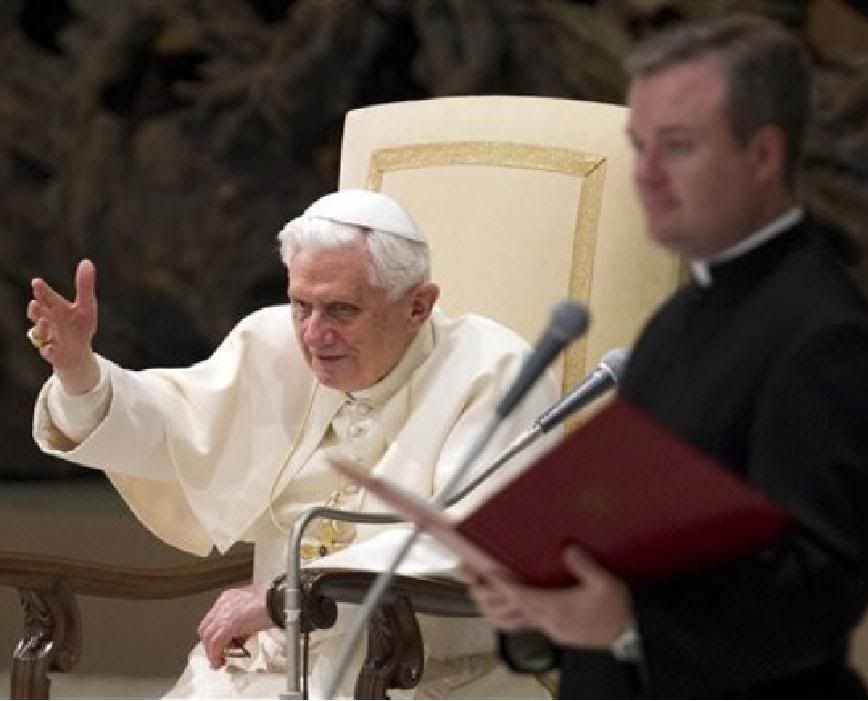


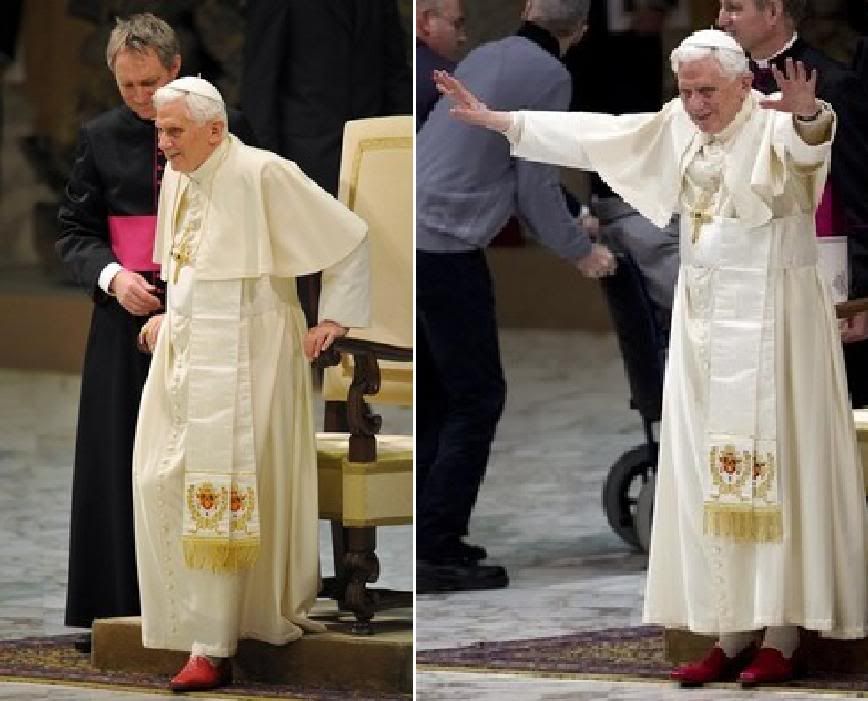
[Modificato da TERESA BENEDETTA 27/01/2011 01:17] |